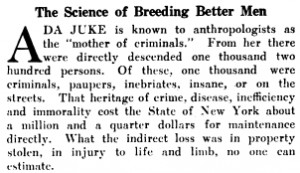Editorial from a 1911 edition of Scientific American [Source]: Sci-Am’s Editor’s note: This editorial was written and published in 1911. Although our editors of a century ago pondered some lofty aspirations for the orderly future of humans, it was only three decades later that the brutal reality of a Nazi social order suffused with a …
Category: American Eugenics
The Jaffe Memo and Eugenics
After World War 2, it became unwise to advocate for eugenics openly. However, since eugenicists believed that they were only extending scientific principles, and felt that they stood on the bedrock of Darwinian truth, they could not just abandon the program. They explicitly took to covert means of advancing their agenda, and, deprived of coercive …
Julian Huxley: Population Control, Eugenics, and Birth Control all part of the same Program
Contemporary advocates for birth control exhibit no awareness whatsoever that birth control was always conceived in the context of ‘eliminating the unfit,’ ie., eugenics. Eugenics, in turn, was considered a straight-forward logical extension of Darwinism. Eugenics was seen as human control of human evolution, and was always tied into discussions on ‘population control.’ These are …
Julian Huxley: Diversity and Eugenics in Education
Humanism and eugenics have long been associated together, although it is the brave secularist today who would dream of admitting it. In this 1964 excerpt from his essay, “Education and Humanism” (found in Evolutionary Humanism, pg 135), Julian Huxley is reflecting on the need to transform education into an evolutionary mechanism, which, by virtue of …
Excerpt: Darwin’s Dilemma as told by Bertrand Russell, from Designing Babies
From Designing Babies: The Brave New World of Reproductive Technology by Roger Gosden. W.H. Freeman and Company, New York. 1999. Page 3-4 According to Darwin’s theory, natural selection decides which individuals are fit to survive and breed. So powerful was this idea that it quickly engaged not only fellow biologists but also intellectuals who were …
Eugenics Must Begin with the Family: Paul Popenoe
From David Popenoe in War Over the Family p 235-236 (regarding his father, Paul Popenoe): In keeping with the decline of hereditarianism in American intellectual life, Paul Popenoe gradually shifted his professional efforts from genetic improvement to family improvement. With the help of some influential financial donors, he started the American Institute of Family Relations (then …
Eugenics Quote of the Day: Birth Control is about Weeding out the Unfit; so says Margaret Sanger
“Birth control itself … is nothing more or less than the facilitation of the process of weeding out the unfit, of preventing the birth of defectives or of those who will become defectives.” So says MARGARET SANGER.
Davenport: Death is Nature’s Great Blessing to the Race. Why Keep Defectives Alive?
Charles Davenport, in The Eugenic Programme And Progress in its Achievement (1914) [italics in original, bold added] The lowest stratum of society has, on the other hand, neither intelligence nor self-control enough to justify the State to leave its matings in their own hands. On the contrary, the defectives and criminalistic are, so far as …
Defective Genes are Like Pathogenic bacteria and viruses the Law Must Control
As quoted in The New Diagnostics by Dorothy Nelkin and Laurence Tancredi, 1989 (pg 13-14) Although the old eugenic generalizations have been cast off, the logic behind them persists, refueled from diagnostic tests and justified in terms of efficiency, effectiveness, and cost. Thus some geneticists suggest the social importance of improving the “gene pool.” For …
Charity a Hindrance to Natural Selection
In the following foreword from a compilation of 12 eugenic lectures (1914), we see that eugenics is perceived as merely applied evolution. Furthermore, ‘modern man,’ being a sympathetic being, keeps alive those that should die. With luck, principles of breeding already used with animals will be brought to bear on humans. ——————- Foreword by Lewellys …


Recent Comments